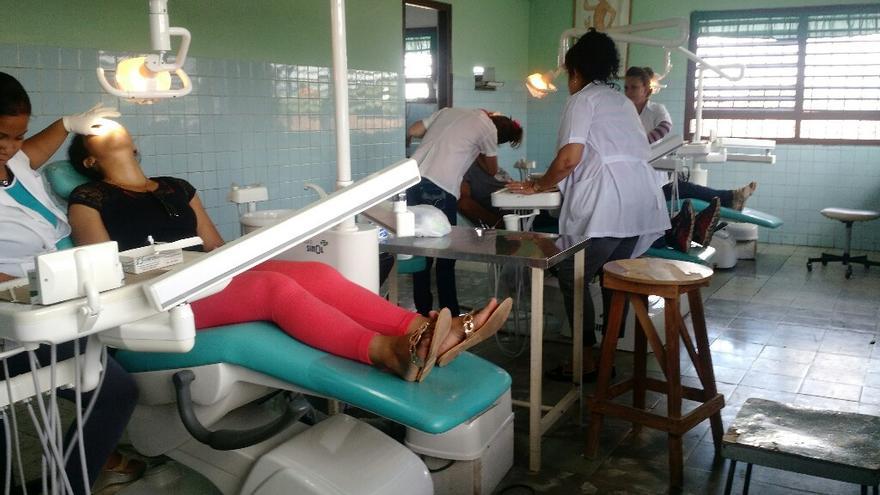
![]() 14ymedio, Luz Escobar, Havana, 15 August 2020 — The pain appears on Sunday night. That tooth that broke months ago shows its face. I try to think that the discomfort will pass, as we always think when we have pain. And it may happen, but for the moment: pain is just a symptom that something is rotten. The next day, the cheek is all swollen.
14ymedio, Luz Escobar, Havana, 15 August 2020 — The pain appears on Sunday night. That tooth that broke months ago shows its face. I try to think that the discomfort will pass, as we always think when we have pain. And it may happen, but for the moment: pain is just a symptom that something is rotten. The next day, the cheek is all swollen.
I should have gone to the dentist earlier, I think. Now, in full return to the confinement of the pandemic, just as the city abandons phase 1 of the de-escalation and resumes the strictest measures against the coronavirus, going to a medical consultation seems to me little less than a slow suicide.
I consult some medical friends over the phone and they all give the same advice: start taking antibiotics and then go to the dentist. I listen to them, but I can only take the antibiotics for 48 hours: which is the amount I have on hand. I know that I will not get more in pharmacies, where there is a shortage of drugs.
The situation does not improve and an infection in the mouth is serious. I pluck up the courage to go to the nearest polyclinic.
I clean my shoes on a blanket soaked in chlorine, I rub my hands with a few drops of hypochlorite, and I am ready to walk through the door of the health center.
In the waiting room, there are only two people: an older man also with a toothache — his seems more serious than mine, because he covers his cheek with a handkerchief — and a young man whose lip has been bitten by a dog.
I should have come earlier, I think again. But the truth is that the terror of contagion gripped me, knowing the limited means of protection that are used in the clinics.
At the window to ask for the turn to be seen, the employee says that they are only attending emergency cases. “Until now we had the consultation open but as of noon they told us to close,” she explains. I detail my case and show her my face, and she calls one of the dentists on duty to decide whether or not I can pass. The inflammation is eloquent: the specialist decides to treat me.
While I wait, dentists are leaving one after another and saying goodbye to their colleagues. “I’m leaving, tell my patients that I’m not coming back until classes start, whatever it is, in December or January,” says one. It has to be a joke.
Fifteen minutes later, they announce that we must wait another half hour to be seen. “All the instruments right now are in the autoclave — the sterilizing device — I ask you not to leave so that you do not miss this opportunity,” says an employee to the three of us who are waiting in the room, patients in its double meaning.
Finally it happened. At the consultation, I see that the dentist and his assistant are wearing double masks and a transparent plastic mask. He puts on the new gloves: “Open your mouth!”
I freeze, nervous with fear. With so many daily cases that are being reported in the country, there is a greater possibility of transmission of the disease in such a place, I tell the doctor.
“It is true that the routine we have constantly exposes us to the virus. Here everything is a risk, the viral load that patients expel, the use of instruments and machines, the inevitable proximity to the mouth, are all high-risk operations in the middle of the pandemic,” says the assistant, trying to reassure me. “But don’t worry, we have taken all the measures we have within our power.”
Finally I open my mouth and after looking at the affected area with the mirror, the doctor says: “There is only one way out for this, extraction.” The operation ends in ten minutes. I can’t help but wonder if those ten minutes have been enough for the contagion.
“I’m going to prescribe you azithromycin, which is now the only antibiotic available, and dipyrone in case you have pain,” says the dentist, also noting the specific pharmacy to go to.
In the pharmacy the employee charges me 11 pesos for three antibiotic tablets and warns me: “Forget about dipyrone, there is no such thing anywhere.”
_____________
COLLABORATE WITH OUR WORK: The 14ymedio team is committed to practicing serious journalism that reflects Cuba’s reality in all its depth. Thank you for joining us on this long journey. We invite you to continue supporting us by becoming a member of 14ymedio now. Together we can continue transforming journalism in Cuba.
